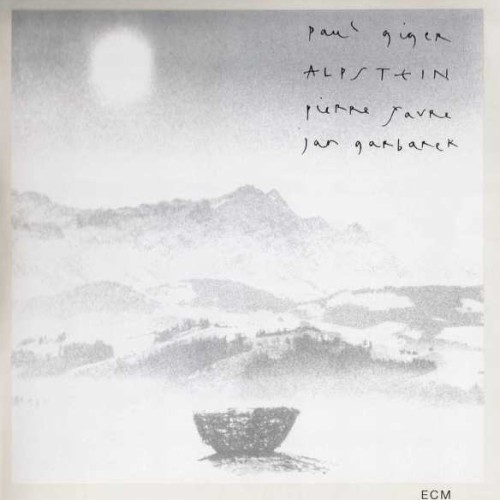Paul Giger violin
Jan Garbarek tenor saxophone
Pierre Favre percussion
Musicians from Appenzell (Switzerland) silvesterchlauseschuppel, schellenschötter
Recorded 1990/91 at Rainbow Studio, Oslo; 1990 at Trogen
Engineer: Jan Erik Kongshaug
Produced by Manfred Eicher
ECM 1426
The first time I heard Swiss violinist Paul Giger, my soul wept. His ECM New Series debut, Chartres, remains for me a most powerful experience that is not to be taken lightly. His is a spiritualism beyond the trappings of human politics, a transcendent stage populated by a wavering circle of human-animal hybrids, faceless musicians, and dancers of many forms. For this, his follow-up album, Giger is joined by saxophonist Jan Garbarek and percussionist Pierre Favre for a sonic portrait of his homeland. Delving into folk traditions both alive and mummified, this trio gives us as wintry and as visceral an experience as possible without ever stepping foot in its eponymous mountain range. This is no mere auditory postcard, but a concerted effort to flip the land inside out and expose, as from under the logs we overturned as children, the life teeming within.
This music came into my life when I still had a violin in my hands. At the time, I was struggling with the idea of expressing my inner voice through an external instrument. I wanted to “sing” through this four-stringed object, but found that my breath just wasn’t coming through. Hearing Giger showed me it was possible, and this album’s second piece, Karma Shadub (Dancing Star), is something I played quite often in my ultimately futile attempts to emulate a sound that was beyond me. I even performed it once with an interpretive dancer at a high school assembly. Though the violin soon faded from my grasp, I remain ever in its shadow, a humble and open listener of its masters, of which Giger is a nonpareil example. Every dissolve of Karma reveals new visual combinations, each so rudimentary, so fundamentally alive. Garbarek’s throaty call gracefully dovetails with Giger’s own in an arresting combination of dance and darkness. Alpsegen introduces the album’s first percussive colors. A caravan of metallic nomads, ranging from tambura to cymbals, processes across an ever-widening sound palette. Cowbells recede like ancestors as Giger leaps in evolutionary pirouettes. On Chuereihe, Garbarek revisits the herding calls that so enthralled us on Dansere, and takes us on a long climb to the peaks into which the cover photography beckons us. Giger’s violin here is sometimes insectile, sometimes onomatopoetic, but always anchored by Favre’s deepening drums. Chlauseschuppel gives us a taste of the Appenzeller bells, rung at the end of every year to ward off foul spirits as the new one is welcomed.
When I first heard Trogener Chilbiläbe, which closes the disc, its backdrop of urban sounds led me to believe it had been recorded in a church with the door flung open. Its inspiring solo cycles of fast runs and soaring meditations end with a slam, as if shutting out the noise of the outside world. Only later did I discover that the door in question belongs to a prison cell, and that the piece was recorded in the jail where Giger must serve out a few days of each year for refusing to pay military tax. As fascinating as these biographical minutiae are, it is the Zäuerli, a haunting yodel particular to the Alpstein region making three appearances here, that is the album’s lifeblood. In order to evoke its polyphonic splendor via a single instrument, Giger taps his fingers on open strings, thereby eliciting harmonics from the shadows. These hidden voices are his aesthetic soil, and take form seemingly of their own volition. As we come to be wrapped in their atmospheric blankets, we are awakened even as we slumber.
Alpstein is a cosmic alignment in and of itself. Like all of Giger’s albums, itis markedly different from the rest but touches us just as deeply. He may not always look to the same future, but he does draw from the same mythic past. His playing is only one step removed from breath, for every stroke of the bow nourishes the universe like air to a lung.
